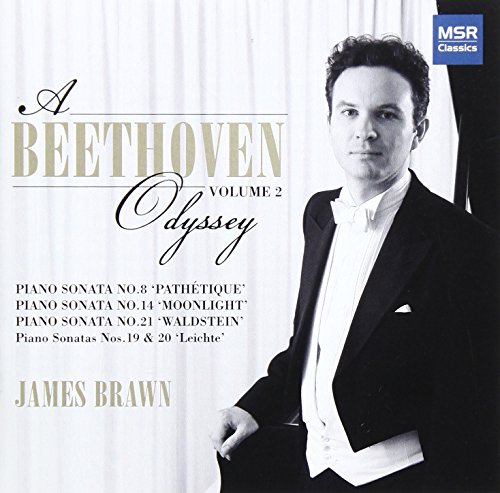A Beethoven Odyssey - Volume 1: Piano Sonatas No.1, 3 and 23 Appassionata


In the same way that Beethoven's spirit profoundly animates the performance of these works, Brawn's imaginative interpretations inform this series of recordings. His detailed contemplation of each movement, each sonata, adds something new to the dialogue. At the same time, he exhibits respect for the tradition that traces its origins to the composer himself. This is not surprising because Brawn studied with pupils of Beethoven interpreters like Solomon Cutner, Claudio Arrau, and Rudolf Serkin, all of whom had a strong connection to and affinity with the composer s music. Furthermore, Beethoven's piano sonatas are as relevant today as they were two hundred years ago. James Brawn strives to make the historical connection apparent to his listeners. In Vol. 2, his personal comments about the stories behind the music appear in italics so that they are easily distinguishable from the musicological text that accompanies them. Subjective comments such as these provide a valuable, behind the scenes look at how artistic choices are made.
An Australian debut in Mozart's Piano Concerto No. 25 marks the start of pianist James Brawn's solo career at age 12. Brawn credits subsequent achievements to the great pianists with whom he has studied, taking pride in teachers who trace their pedagogical lineage back to Beethoven, Chopin, Liszt and Clara Schumann. Yet he has forged his own musical path as well as a soloist, chamber musician and pedagogue.
Born in England in 1971, his career in music began in New Zealand, where he began piano lessons at age seven. He played Bartok on New Zealand television and won his first awards in Auckland. The family moved to Australia the following year, where he studied with Margaret Schofield, Ronald Farren-Price and Rita Reichman, and won major prizes at all the Melbourne Eisteddfods competitions, and the Hephzibah Menuhin Memorial Scholarship. In 1987, Brawn reached the concerto final of the ABC Young Performers Awards, which led to concerts with the Adelaide and Melbourne Symphony Orchestras. He continued study with Rita Reichman in Philadelphia on a grant from the Australia Arts Council, and in 1988 received a full scholarship to the Royal Academy of Music, where he won many recital awards, including the Beethoven Prize and 20th Century Prize.
At age 19, Brawn won the Keyboard Final of the Royal Over-Seas League Music Competition, which resulted in solo recitals at Queen Elizabeth Hall and chamber music partnerships at music societies and festivals in the UK. From 1993-2001, Brawn taught piano and chamber music at King's College and St. John's College schools in Cambridge, during which time he also performed in recital with his wife, soprano Susan, and sister, oboist Victoria. These collaborations led to performances at the Cambridge Elgar Festival and the Purcell Room in London. From 1996-1998, Brawn and sister Victoria also received sponsorship from the Countess of Munster Recital Scheme. In 2001, he returned to Australia to take up a piano teaching position at highly regarded Scotch College, where he co- founded the biennial Scotch College Piano Festival. Whilst teaching there, he appeared in recital at the Melba Festival, Melba Conservatorium, Monash University and at music society events throughout Victoria.
| Country | USA |
| Artist | James Brawn (piano) |
| Binding | Audio CD |
| EAN | 0681585146620 |
| Label | MSR Classics |
| Manufacturer | MSR Classics |
| NumberOfDiscs | 1 |
| NumberOfItems | 1 |
| PublicationDate | 2013 |
| Publisher | MSR Classics |
| ReleaseDate | 2013-07-30 |
| Studio | MSR Classics |